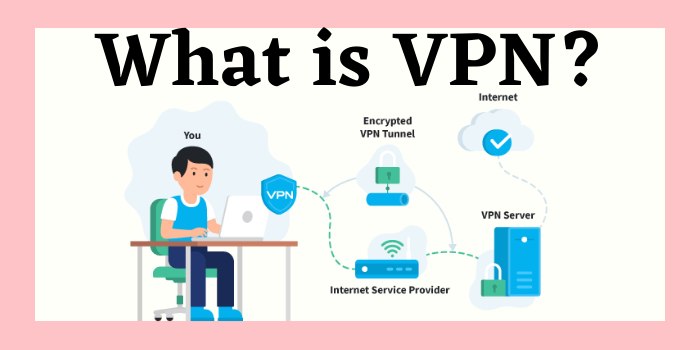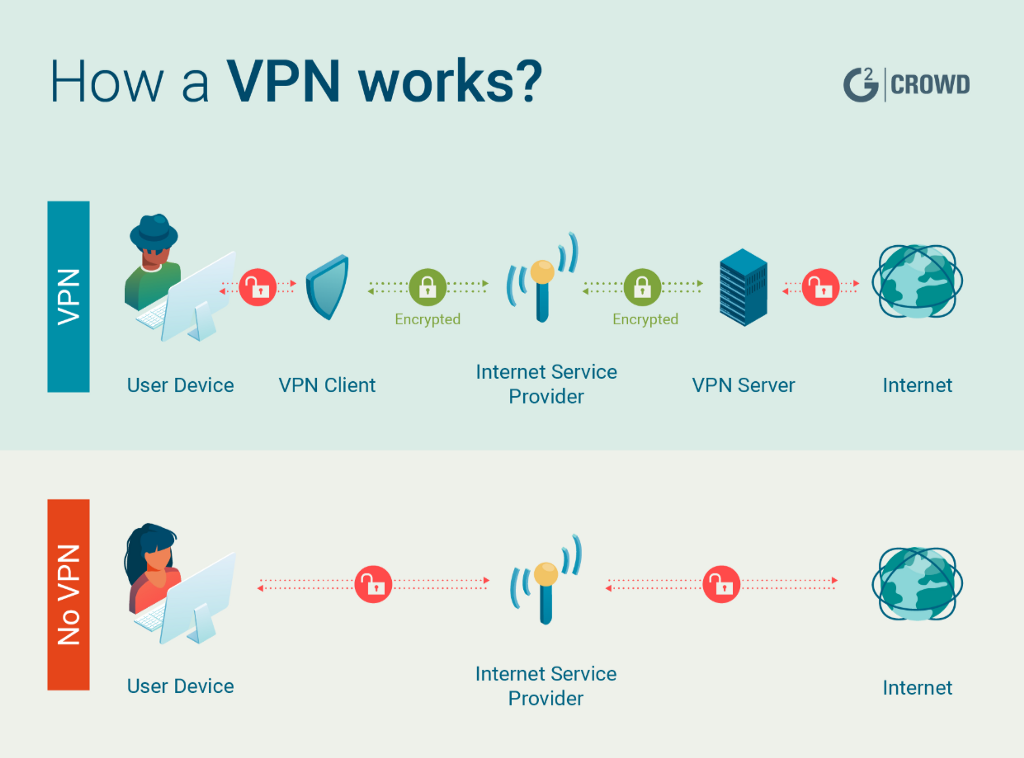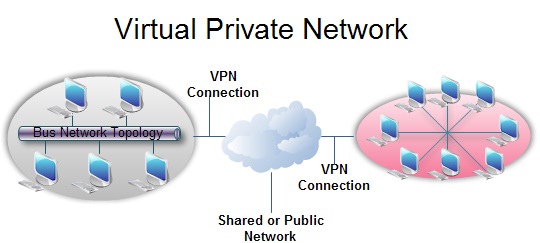Hi Friends! Hope you’re well. I welcome you on board. In this post today, I’ll discuss What is VPN & How Does it Work?
A VPN stands for Virtual Private Network. It is used to hide your online activities from your ISP (internet service provider) and other third parties. This means you can surf online, share your credentials and send and receive data online with confidence. No one can sneak into your personal data and browsing history. Plus, it gives access to prohibited websites that you cannot see with your regular internet connection. A VPN hides your IP address and replaces it with another string of numbers from another location, which means no one can identify your actual location and IP address. Most companies and individuals use VPN to keep their personal data from the eyes of potential hackers and cyber threats. We will try to cover everything about VPN buy you can learn more about VPN here.
I suggest you read this post all the way through as I’ll be covering What is VPN & and How Does it Work.
Let’s jump right in.
What is VPN?
A VPN is a virtual network that keeps your online activities secure and private. It blocks your actual IP address and your identity, which means no outsider can break into what you’re doing online. A VPN keeps location and browsing history private, making it difficult for third parties to trace your online activities.

How Does it Work?
A VPN encrypts your data you send or receive online. That means when you connect to the VPN, your internet connection will redirect to the server of the VPN service provider instead of your ISP that masks your IP address – thereby protecting your online identity.
Encryption means creating a tunnel between your device and the internet where your data is transferred into a code which only you and your VPN host can decipher. Even if someone wants to interpret your data, it becomes useless when it reaches the final destination.
Without VPN your data is not encrypted, which means anyone can track your IP address, exposing your online identity and figuring out what sites you browse and the data you send or receive online.
Know that, a VPN only takes care of protecting your online identity and the data you send or receive online. That means it only secures the transmission of your data. The data on your device is still vulnerable to potential hackers and phishing scams for which you require anti-virus software.

Advantages of a VPN
A good VPN comes with many benefits. From securing your IP address and online identity to accessing prohibited content and secure data transfer, it covers all. You need a VPN connection if you want your online activities to remain untraced, i.e. the websites you visit, data you send or receive online and the time you spend on each website.
1: Hiding your identity and location
Your online identity remains hidden when you connect to the server of the VPN host. Your actual location remains unidentified and you appear from the location you set on the VPN server. Additionally, most VPN don’t store your browsing history and logs of your online activity. Even if they store it for personal record, they don’t reveal it to any third party.
2: Unlock prohibited content
Besides securing your online identity, a VPN is also used to unlock prohibited content.
In some countries, governments don’t allow their citizens to access a certain content. The content may include adult media or different political and religious views. What VPN does is make you appear as you’re watching the content from another location. It hides your IP address and online identity, giving you access to the prohibited content.
For instance, some exclusive content you watch in US may not watch in UK. There are some UK Netflix series that you cannot watch if you’re located in US. With VPN, you can unlock the exclusive content only by picking the location of that country on the VPN server.
3: Protect Data Transfer
Not to mention, remote work has gone mainstream after Covid-19 hit the world with its wrath. More often, remote workers need access to the company’s servers for important files and documents. Even though most companies take care of their internet connection and personal data, they are not sure if your connection is secure and safe against potential hackers. In that case, companies provide access to the private files with a VPN that acts as a secure bridge between the company and the worker, so no third party can sneak into their personal data.
4: Hide your data from businesses
You’ll find many businesses offering you free Wi-Fi and apps to download when you visit their outlet. Be careful when you connect to their Wi-Fi, because they offer you free internet in exchange of collecting your data. To secure your personal data and remain hidden from the eyes of those retailers, it’s better to use VPN. This way they cannot identify your online activities and you can surf securely as you like better.
5: Safely Use Public Wi-Fi
There are places where you cannot use 3G or 4G of your mobile network, but you still want some online work done at that moment. You may want to read the news on your cell phone, check important emails from your boss or scroll through your social accounts. Either way, you’re tempted to use public Wi-Fi.
Most public Wi-Fi connections are free to use for anyone, as they are not password protected. But they do come with a risk of potential hacker getting into the details of your personal data as you connect your device with the Wi-Fi. However, if you connect the VPN before performing online activities, no one can identify your location and online presence, giving your data an extra layer of security and peace of mind where you can use the internet anonymously without fear of getting hacked by the hacker.
Types of VPN
There are four main types of VPN services.
- Personal VPN
- Remote access VPN
- Site to Site VPN
- Mobile VPN
VPNs are used to develop private and secure connections with the open internet. Mostly personal VPNs are used, however, most businesses and organizations leverage remote access VPNs to allow their member access private files and share and receive data securely over the internet.

Let’s discuss each VPN one by one.
1: Personal VPN
A personal VPN – also known as commercial VPN or consumer VPN – is mostly used by individuals. It connects your device with a VPN server and acts as a bridge between your device and the online activity you want to perform. The personal VPN hides your identify and location by encrypting your data.
There are many reasons you’ll prefer personal VPN. For instance, you can get access to media unavailable to your geographic location. In some authoritarian states like UAE and China, they have developed a national firewalls which block a certain content and make it unavailable to the general public. What VPN does is give access to that content by hiding your web traffic from their monitoring systems.
How does it Work:
Simply install the app on your device provided by a VPN service provider. The personal VPNs come with a plenty of servers network to pick from. If your privacy is the primary concern, connect with the local server for the fast speed. However, if you want access to the prohibited content, choose the server where that content is accessible. Connect with the personal VPN and browse the internet like a regular user.
2: Remote Access VPN
A remote access VPN, also known as client-based VPN, connects your device to the private network as opposed to personal VPN that doesn’t give access to the private network instead it gives access to the public internet by developing extra layer of security with encrypted connection.
Most business owners use remote access VPN to develop a connection between the company’s network and the public Wi-Fi. This way they can leverage all the private files and documents as they would have connected with the office Wi-Fi. The remote VPN keeps the exploring, sending and receiving those files secure and private from the outsider.
How Does it Work
Install the client software on your device. Initially, the VPN server checks whether the user is identified and is allowed to use the network. This might involve doing biometric such as using a thumb or entering a password for the identification. Once the authentication process is done, an encrypted tunnel is established between the user’s device and the server, allowing the user to perform online activities like a regular user by protecting the traffic going over the VPN server.
3: Site to Site VPN
Site to Site VPN is slightly different from the remote access VPN. The remote access VPN allows the user to get access to the private network and use its resources, while Site to Site VPN, on the other hand, combines two networks together located on different sites. For instance, if your company has two offices established on entirely different locations, a Site to Site VPN can be applied to join them in a single network.
How Does it Work:
Technologies used to implement site to site VPN include: L3VPN, Dynamic multipoint VPN and IPsec tunnel.
IPsec joins two router together to join different networks. However, this process doesn’t suit well for the companies with thousands of sites. In that case Dynamic multipoint VPN is used that joins thousands of sites together using dynamic IP addresses.
Both IPsec and multipoint VPN don’t guarantee consistent performance as they remain on the top of the internet. For global connectivity and good quality, L3VPN is used.
4: Mobile VPN
Mobile VPNs are similar to remote access VPNs which means you can access them from anywhere except if you continuously change your location. For instance, when you use remote access VPNs, they give you access to the network, assuming you are located at one location. When you leave that location and get no signal from the public Wi-Fi, your connection with the remote VPN gets lost. In contrast, with mobile VPN that you use on your smartphone devices, your connection with the network remains intact no matter your location is.
How Does it Work:
Process is similar to the remote access VPN. You require authentication before establishing mobile VPN which require password or biometric process. Once the authentication is done, a virtual tunnel is developed between the VPN server and mobile device. Know that in mobile VPN the connection persists even if your device switches between different network such as public Wi-Fi or cellular network. When the network changes, the IP address will change but the IP address allocated to the VPN tunnel remains the same no matter network you use.
Things to Consider Before Choosing a VPN
Still reading? Perfect.
It shows you’re really curious to know the key considerations before picking the right VPN for you.
Here are a few things to consider:
Check if the VPN is free. Know that free doesn’t mean it’s totally free. Companies who offer free VPNs cover their cost by running ads and sharing users’ data to third parties.
Do your due diligence to check the security experience of your provider. You should demand online security and privacy and make sure they comply with the rules and regulations they have mentioned in their terms of service and privacy policy.
Even though some reviews are genuine but not all reviews are independent and unbiased. Some VPN companies pay for other websites to publish an excellent review about them. So be critical while picking the right VPN Company for you.
The VPN companies rent servers worldwide. Don’t just pick the service provider with the largest number of networks. Because more networks means the company has less control over them.
That’s all for today. Hope you’re enjoyed reading this article. If you have any question, please ask in the section below. I’d love to help you the best way I can. Thank you for reading the article.








































 Virtual Private Network(VPN)
Virtual Private Network(VPN) syedzainnasir
syedzainnasir 0 Comments
0 Comments

















